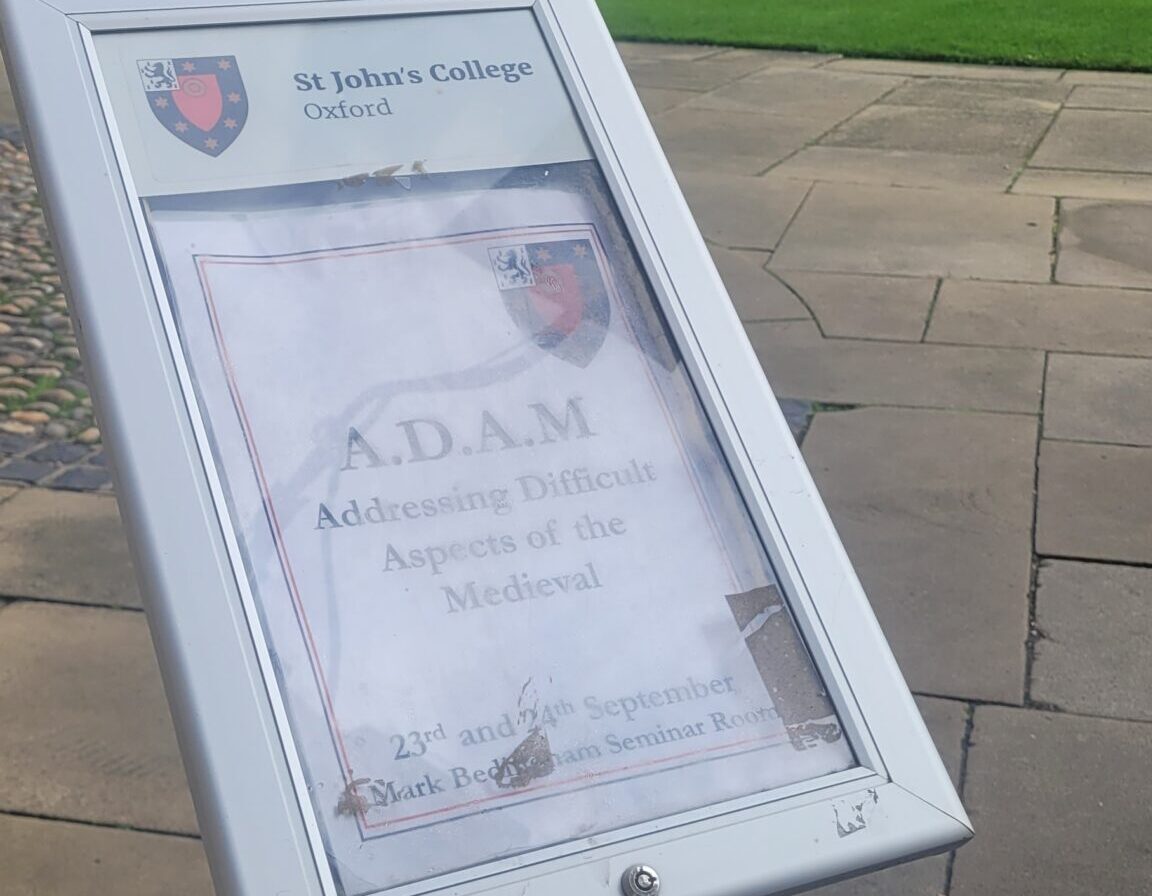The inaugural ADAM (Addressing Difficult Aspects of the Medieval) workshop took place from the 23rd–24th September 2024 at St. John’s College, University of Oxford.
The programme on Monday 23rd began with a 90-minute discussion of the ‘Möndull-Ingibjörg’ episode from Göngu-Hrólfs saga. The committee selected this episode as it contains references to sexual assault, physical disability, and race.
We distributed the text in an English translation several weeks before the workshop. In the session we discussed: the ‘sanitisation’ of sexual violence and racial insensitivity through translation; the difficulty in mapping contemporary understandings of rape, race, and disability onto the past; the scholar’s positionality in their approach to these topics. The conversation soon moved beyond the text to consider these issues in academia at large. Positionality was particularly controversial, with delegates discussing their discomfort in studying topics without lived experience – ‘am I the right person to be speaking about this?’ – and the potential advantages and disadvantages to foregrounding one’s own experience in academic work. The conversation led us to consider how research grounded in lived experience might complement that which is not, and how scholars of different positionalities might collaborate.
This opening discussion was followed by two paper sessions, the first of which was on ‘Facing the public: What do people want from history?’ and the second on ‘Ethnic identities: interrogating nationhood and colonialism’. Among the papers, we heard considerations of: the risk of harassment faced by women scholars; museological representations of slavery; racial erasure in the interpretation of a Middle English lyric; and the miscategorisation of the ‘Ruthanian’ language along contemporary national lines.
These sessions were followed by a keynote presentation from Professor Corinne Saunders (University of Durham). Professor Saunders gave an instructive account of her movement from her doctoral thesis, to her seminal monograph on ‘Rape and Ravishment’; an academic path she did not anticipate as a postgraduate. She was aware of the pressure upon scholars who ‘fall into’ the study of topics such as these to equip themselves both academically and psychologically. She also noted that a project can become more ‘difficult’ due to external factors, such as when COVID-19 and the murder of George Floyd coincided with the final stage of a project on ‘breathlessness’.

The following day began with a group tour with the Uncomfortable Oxford social enterprise. In our scheduled discussion afterwards, delegates were especially taken by the tour’s engagement with the history of antisemitism in the city and the location of a number of University landmarks atop significant Jewish sites. We discussed the University’s reticence when addressing difficult histories and the insufficiency of the ‘plaque response’, whereby a commemorative plaque is erected in a way that might be easily overlooked or dismissed. Delegates debated the best way to supplement such a response so that these aspects of institutional history sit alongside prevailing, comfortable narratives.
Two sessions followed under the banner of ‘Sexual interactions’, the first considering ‘Power structures and interpersonal relationships’ and the second ‘Violence, affect, and audience’. Dividing this topic into two allowed delegates to engage with medieval representations of sexual material that frustrate contemporary categories. We heard papers on the study of: conjugal violence in court reports of 15th-century Freising; how best to teach the phenomenon of the ‘raping hero’; and ‘compassion fatigue’ in scholars dealing with artistic representations of Lucretia’s rape by Tarquinius.
The workshop concluded with a panel on ‘Redefinitions: Moving beyond structures’, which dovetailed with our recurrent discussions of terminology and the lack of overlap between contemporary language and historical concepts. Papers were presented on the inadequacy of contemporary disability theory in appraising medieval medical text, and the applicability of queer theory to the interpretation of cross-dressing in a monastic context. The workshop concluded with an hour-long discussion, in which we restated our need to wrangle with contemporary language and its misalignment with the categories of the past, as well as to continuously re-evaluate ‘best practice’ in addressing these difficult topics, both in the classroom and in scholarship.
We canvassed for anonymous feedback from our delegates following the workshop and the response has been uniformly positive, with comments emphasising the value of the workshop environment for rigorous and respectful debate. Our delegates have offered a number of suggestions for the network’s development and we now look towards implementing a mailing list and website to provide resources for scholars, organising an edited collection of papers from the workshop, and arranging an open conference at Heinrich Heine University Düsseldorf. We have also been invited to collaborate with Corinne Saunders in her work at The Affective Experience Lab, University of Durham.
We are most grateful to OMS for the financial support.
Adam Kelly (University of Oxford), Grace O’Duffy (University of Oxford), Elliot Worrall (Heinrich Heine University Düsseldorf)
